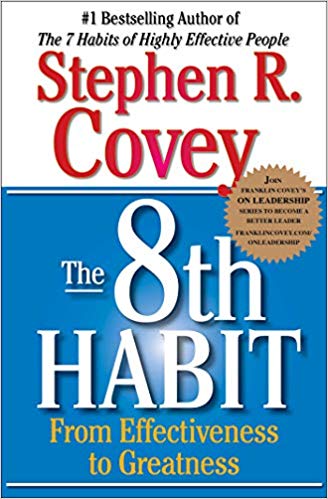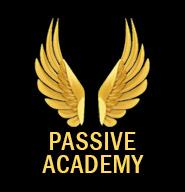The 8th Habit Summary
- Book by Stephen R. Covey
The Book in Three Sentences
The 8th habit summary at a glance:
1. This book is about leadership as it should be.
2. After discussing the 7 habits of highly effective people that helps in the transformation from being dependent to being interdependent, then focusing on personal growth in four main areas: body, mind, heart, and spirit. Stephen Covey wrote this book “The 8th Habit” which is a go-to guide in leadership.
3. The 8th habit is about finding your voice and helping others find their own, in order to thrive at work in the Information Age.
The 5 Big Ideas
1. Each individual is born with the potential to be great. What you do with this potential is up to you.
2. Find your voice:
- Recognize and develop your true nature.
- Express your voice through vision, discipline, passion and conscience.
Then inspire others to find their own voice. Live and set an example of what you have learned.
3. You have the freedom and power to choose. You have the power to direct your own life based on your own values.
4. Leaders enable a person to be the best that he could possibly be. Leaders empower people. Managers, on the other hand, run corporations and organize things. So, you should manage things while you lead people.
5. The ultimate path to harnessing all 8 Habits is to serve others. The real reason organizations are established is to serve human needs.
The 8th Habit
b. Inspire others to find their voices:
To build Focus:
1. Expand your influence
2. Be trustworthy
3. Build trust
4. Blend other’s voices
5. Create a common vision
To execute better:
1. Align goals and systems
2. Empower others
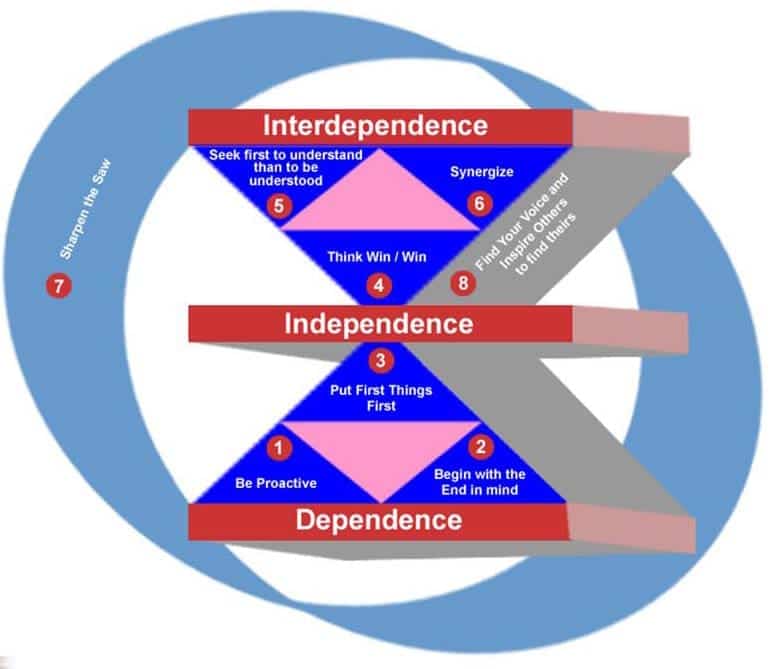
The 8th Habit Summary
a. Find Your Voice
1. Discover Your Own Voice
First of all, to be a leader and to help others find their voice, you first have to find your own.
And to be able to find your own voice you should know that each individual is born with a set of gifts that he can use throughout his life.
- The Ability to Choose:
The first gift, and the greatest out of all is that you’ve been born with the ability to choose.
It’s obvious that we can’t control what happens to us. But for sure we can decide how we’ll react to it.
You have a choice in the space or time between every action and every reaction. Use that gap and reflect on what has happened and choose your response. So, whether that next step is a step up or down is entirely up to you.
The good news is that if you have chosen mediocrity, it’s never too late to turn back. You can choose greatness instead.
- The Four Kinds of Intelligence:
As we know from the 7 habits of highly effective people, a whole person has four basic components: body, mind, heart, and spirit. So, the four kinds of intelligence are:
1. Body: PQ is physical intelligence – It takes place without your conscious awareness. You do not have to think to breathe or to make your heart beat. It maintains health, ward off infection and so forth.
2. Mind: IQ is mental intelligence – The ability to think and analyse.
3. Heart: EQ is emotional intelligence – The ability of being aware, sensitive and empathetic to communicate with others on a genuine level.
4. Spirit or soul: SQ is spiritual intelligence – This is the most central intelligence because it directs the activities of the other three. It’s your own moral compass, your guiding force, the thing that gives your life a purpose.
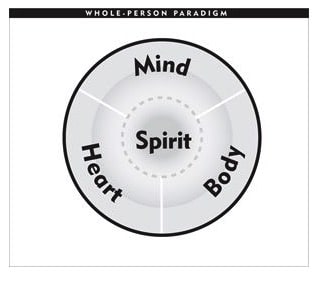
- Highest Expressions:
Each of these components has a corresponding basic need or motivation:
1. Physical body – “To live”.
2. Mind – “To learn”.
3. Heart – “To love”.
4. Spirit – “To leave a legacy”.
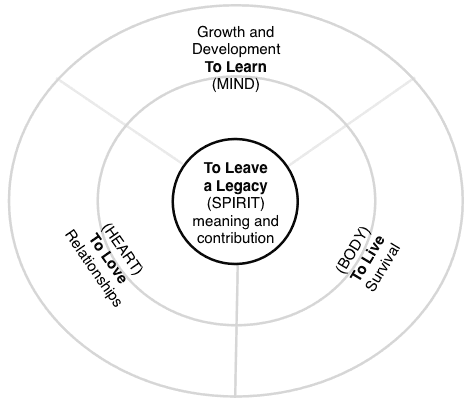
- The Highest Manifestations of These Capacities are:
1. Physical body – Discipline: you need discipline to transform vision into reality.
2. Mind – Vision: when the mind is fully developed you gain vision.
3. Heart – Passion: the flame that sustains the discipline needed to achieve the vision.
4. Spirit – Conscience: an inward moral compass that will guide you.
2. Express Your Voice
“Conscience often provides the why, vision identifies what you’re trying to accomplish, discipline represents how you’re going to accomplish it, and passion represents the strength of feelings behind the why, the what and the how.”
Stephen Covey’s Four Assumptions Exercise for Implementing the 8th Habit:
“I have found that by making four simple assumptions in our lives we can immediately begin leading a more balanced, integrated, powerful life. They are simple – one for each part of our nature – but I promise you that if you do them consistently, you will find a new wellspring of strength and integrity to draw on when you need it most.
1. For the body – assume you’ve had a heart attack; now live accordingly.
2. For the mind – assume the half-life of your profession is two years; now prepare accordingly.
3. For the heart – assume everything you say about another, they can overhear; now speak accordingly.
4. For the spirit – assume you have a one-on-one visit with your Creator every quarter; now live accordingly.”
- How to Apply the 8th Habit in Your Life?
If you apply these four dimensions to any role in your life, you will find your voice in that role. And to be able to do that, you’ll need to answer these four questions:
1. What need do I sense in my family, in my community or in the organization I work for?
2. What talent do I possess which, if properly disciplined and applied, would meet that specific need?
3. Does the opportunity to meet that need tap into the things I feel most passionate about?
4. Does my conscience allow me to take action in this way and become intensively involved?
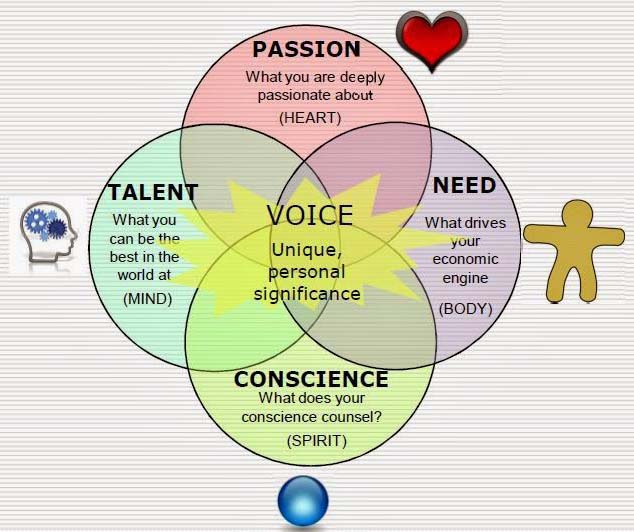
So, when you engage in work (body) that taps your talents (mind) and fuels your passions (heart), which fills the need your conscience (spirit) has drawn you towards, you find your voice.
b. Inspire Others to Find Their Voices
Once you’ve found your own voice, the way you can continue to increase your feelings of achievement is by helping others to find their own unique voices as well, which is the second part of the 8th habit.
“Leadership is communicating to people their worth and potential so clearly that they come to see it in themselves.”
In other words, a leader inspires others to develop their potential and be the best that they can be.
- Management and Leadership:
Leadership and management are both important in an organization.
Leaders enable a person to be the best that he could possibly be. Leaders empower people. Managers, on the other hand, run corporations and organize things.
So, you should manage things while you lead people.
To be a leader, prove yourself trustworthy. Most of the time, leadership failures are caused by failures of character. So, every leader must exemplify core values such as keeping promises and honesty and integrity.
- Leadership Response (Four Roles of Leadership):
1. Modeling (conscience/spirit) - Setting a good example. Prove yourself trustworthy through your actions. Listen to others and practice behaviors that ultimately will give you moral authority.
2. Pathfinding (vision/mind) - The organization must jointly develop a viable strategy which will allow it to move from where it is now to where it wants to be in the future. Pathfinding creates order without demanding it.
3. Aligning (discipline/body) - Set up and manage a system (structures, processes and systems) to stay in course
4. Empowering (passion / heart) - Focus on results, get out of people's way, give advice when requested. Have faith in people’s ability to choose wisely for themselves. Empowerment produces cultural moral authority and unleashes human potential.
That was my review, a very quick look at The 8th Habit. If you haven’t read it yet and you’re interested in it, get a copy. There is a HUGE amount of wisdom and value in this book as you see, and we’ve only touched on a tiny bit of it.

